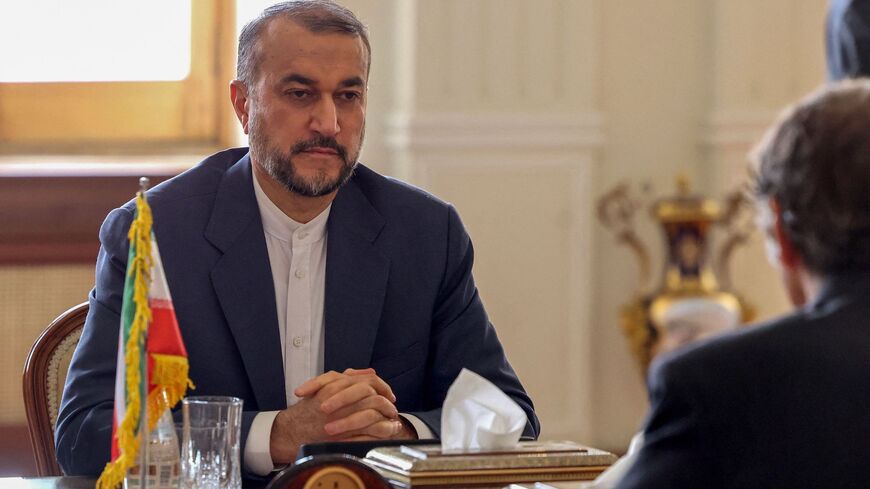The normalization of Iran’s nuclear program
The United States remains on the verge of an arrangement with Iran that the Biden administration is hesitant to call an "agreement," and that reportedly includes increased restrictions and monitoring of its nuclear program in return for some sanctions relief as well as the release of US citizens detained in Iran.
We recently explained the rough framework of this understanding and Biden’s deterrence/diplomacy policies toward Iran here, which complements other regional diplomatic activity such as the Iran-Saudi rapprochement and the reintegration of Syria into the Arab League.
Unlike the Joint Comprehensive Plan of Action (JCPOA), which was solely focused on Iran’s nuclear program, Biden’s approach appears to explicitly link the nuclear talks with what Mark Fitzpatrick calls a "cease-fire" by Iran-backed militias on Americans in Iraq and Syria.
Among the power brokers in Iraq’s ruling political alliance, the Coalition Framework (CF), are the political wings of those militias and other parties and individuals that maintain close ties with Iran. Tehran, therefore, seems to have less incentive to make Iraq a US-Iran battleground these days.
And while Iran surely wants the payday that will come from the release of frozen assets and some sanctions relief, it is in no rush. Its oil exports have reached 1.6 million barrels per day (bpd), circumventing US sanctions, according to The Wall Street Journal. Exports are the most since 2018 when Iran sold 1.85 million bpd, before the United States withdrew from the JCPOA and reimposed sanctions. Iran is selling its oil at a discount to China, Syria, Venezuela and others, including a reported growing market in Latin America and Africa. The discounted oil could be a headache for OPEC, undercutting its recent production cuts as it attempts to regain market influence and control over falling prices, as Jack Dutton explains.
Assuming this US-Iran "understanding" takes hold, and perhaps even if it doesn’t, Iran is increasingly positioning itself to be considered a "normal" nuclear power, a signatory to the Non-Proliferation Treaty (NPT), like Japan or Brazil, willing to cooperate with the International Atomic Energy Agency on the safeguards issue but no more, as Supreme Leader Ayatollah Ali Khamenei has directed his nuclear team.
Iran’s comfort as a nuclear weapons threshold state is not shared by the United States or partners in the region, especially Israel and Saudi Arabia. The kingdom is seeking international support from the United States and others for its own civilian nuclear program.
Iran’s recent posture seems to reflect its sense of self not just as a Middle Eastern power but as an Eastern, or Asian, power, a peer or near-peer with China, India and Russia. Iran has always looked east, but even more so after feeling burned by Europe after the US withdrawal from the JCPOA and the EU going along with US secondary sanctions, crippling Iran’s economy. Along these lines, Iran this week became a full member of the Shanghai Cooperation Organization (SCO), further aligning it with Russia and China and expanding its influence in Central Asia, as Adam Lucente reports.
The Iran-Russian relationship has always been more handshake than embrace, and these days Iran may have an edge, given Moscow’s plight after invading Ukraine. The relationship nonetheless carries risk for Tehran. Ukraine could be a flashpoint for Iran at the UN Security Council this fall. The JCPOA restriction on drone and missile transfers with Iran expires in October. Stephen Rademaker writes that European JCPOA signatories (as the United States withdrew in 2018) can initiate UNSC Resolution 2231’s "snapback" provisions to keep the sanctions in place. A senior Iranian official told us in March that although Tehran denies providing drones to Russia for use in its war against Ukraine, it is willing to begin a dialogue with the EU and Ukraine about its role in the war, but separate from the nuclear talks.
Iran’s brain drain likely to continue
“Deteriorating socioeconomic conditions and the absence of a functioning ecosystem for innovation and entrepreneurship are forcing many young, educated Iranians to migrate,” writes Bijan Khajehpour for Al-Monitor Pro.
A favored destination for migrating Iranians is the UAE.
“The best scenario that the Raisi administration can hope for is a slowing down of the migration patterns of young talent,” explains Khajehpour. “To achieve that, the government needs to relax some of the social and cultural policies and liberalize personal and civic freedoms.”
That for now seems unlikely. Our correspondent in Iran points out that Iranian President Ebrahim Raisi has labeled violations of his country’s hijab law an "enemy conspiracy" and called for a crackdown on women "who are after mayhem in social order" by "intentionally violating" the dress code.
In addition, next week three women journalists — Saeideh Shafiei, Mehrnoush Zarei Henzaki and Nasim Sultan Beigi — go on trial and face up to 10 years in prison after writing critical reports about Iranian policies, as Adam Lucente reports.
Netanyahu holds Iraq ‘responsible’ for safety of Elizabeth Tsurkov
Speaking of those Iran-backed Iraqi militias.
Kataib Hezbollah, a US-designated terrorist group, kidnapped Israeli-Russian researcher Elizabeth Tsurkov in March, as became public this week.
Israeli Prime Minister Benjamin Netanyahu has reportedly reached out directly to Russian President Vladimir Putin to help secure Tsurkov’s release. A statement from Netanyahu’s office said that Iraq was “responsible" for Tsurkov’s safety.
In an interview with Rina Bassist, Emma Tsurkov, Elizabeth’s sister, confirmed that Russia is involved in negotiations to secure Elizabeth’s release.
Tsurkov has been “a fierce and outspoken critic of Israeli brutality against Palestinians,” writes Amberin Zaman, and “rose to prominence through her granular and compassionate reporting on the Syrian uprising. Tsurkov is a fluent Arabic speaker and known for her wide network inside Syria that allowed her to chronicle the misery faced by Syrians in their daily lives in a way that few could.”
The US State Department released a statement Wednesday, saying, “We are aware of this kidnapping and condemn the abduction of private citizens. We defer to Iraqi authorities for comment.”









